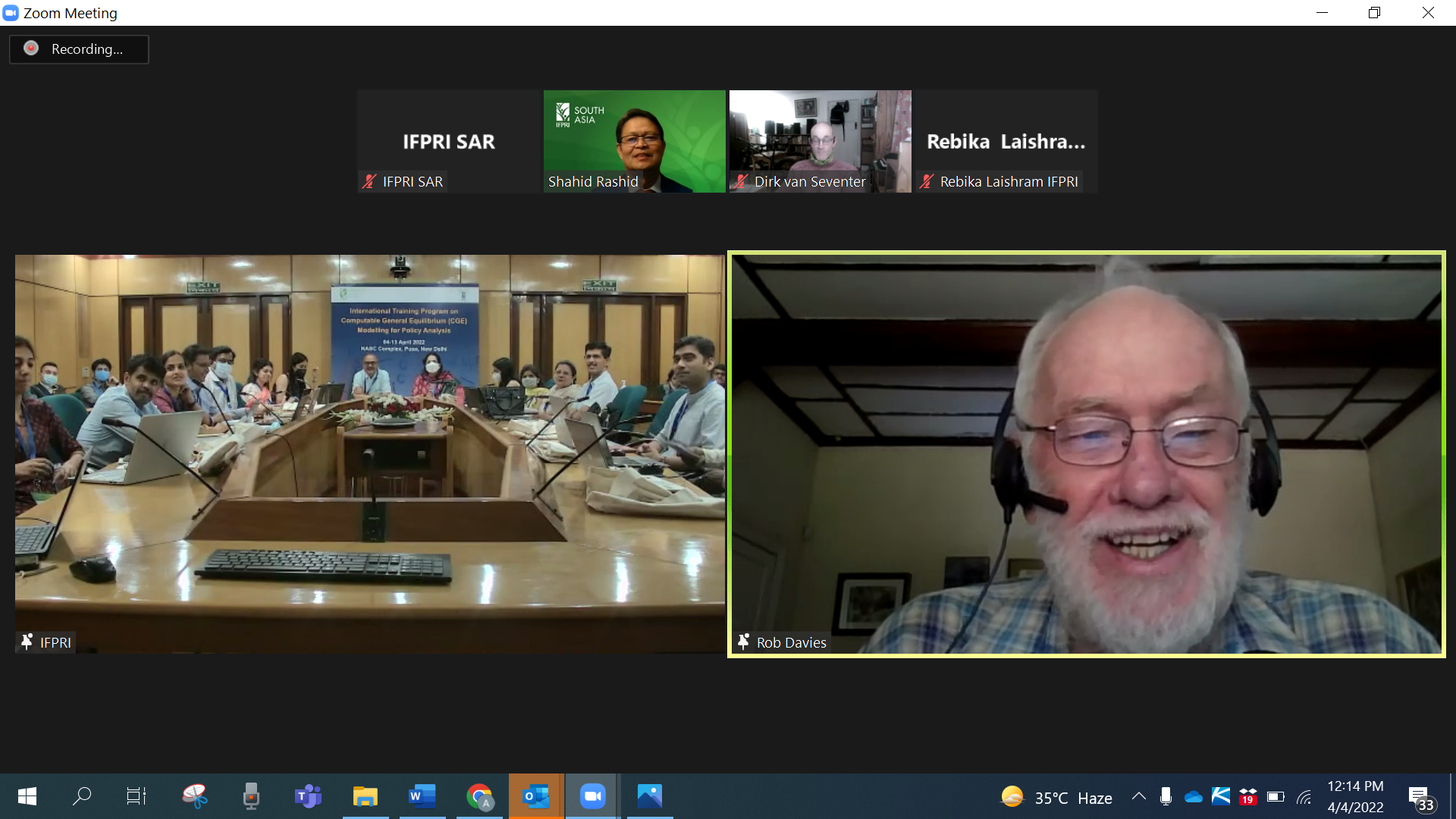Global economies and food systems faced great difficulties in the last two years as the world struggled with multiple waves of COVID-19. Further challenges have arisen in 2022 as the impacts of the Russia–Ukraine conflict continue to reverberate throughout markets and economies and as governments implement various policy measures to deal with rising inflation. Meanwhile, COVID cases continue to subside and then rise again.
Against this backdrop, the International Training Program on Computable General Equilibrium (CGE) Modeling in the Bay of Bengal Initiative for Multi-Sectoral Technical and Economic Cooperation (BIMSTEC) countries launched on April 4. Organized by IFPRI South Asia in partnership with the Indian Council of Agricultural Research (ICAR) and funded by the Bill & Melinda Gates Foundation (BMGF), the training was an output of the Regional Trade and Agricultural Transformation in the Bay of Bengal countries project.
The training, conducted by Rob Davies, Dirk Van Seventer, and Barun Deb Pal, was attended by researchers and scientists from leading think tanks and research institutions in India, Bangladesh, and Nepal, with a balanced gender representation—a remarkable occurrence for a modeling workshop.
At the inaugural session, IFPRI-South Asia Director Shahidur Rashid remarked on the importance of CGE modeling for serving one’s country and achieving professional satisfaction. Citing the Russia-Ukraine conflict, he noted that food, oil, and fertilizer prices have skyrocketed, and, as a result, governments are attempting to manage their subsidies even as inflation rises.
“In India, subsidy costs have risen from $11 billion to nearly $20 billion. A good CGE model could help analyze such situations and find optimal mitigating solutions. The advantage of this model is that if you have the setup ready, you can generate counterfactuals quickly and contribute to ongoing discussions. Mastering this tool would thus be an important part of critical policy-related decision-making,” he said. CGE modelers can help countries dealing with these types of situations to optimize their investments, assessing options and tradeoffs that would achieve the best possible outcomes.
Though CGE is a powerful tool that can help analyze a wide range of policy issues, it rarely receives appropriate attention in academic trainings, particularly in South Asia. Most economic curricula deal with macroeconomic tools to study the economy as a whole and microeconomic tools to understand the behavior of individual agents or markets, but public- and private-sector policy analysts often require an economy-wide perspective on the policies they design, implement, and monitor. Modeling techniques like input-output and social accounting matrix (SAM) analyses, which capture economy-wide impacts, have become more widely used to analyze the impact of policy-related and other changes on the economy. CGE modeling builds on these techniques to allow for a wider range of behavioral responses and interactions, and the IT revolution has transformed it into a frequently used device in the practical economist’s everyday toolkit. This CGE modeling training will also help participating economists prepare to integrate climate models that address cooperation and partnership structures in BIMSTEC.
Addressing the gathered participants, R.C. Agrawal, Deputy Director General of the Agriculture Education Division at ICAR, said, “It is essential to develop expertise in the computer programs and work with them to address the current economic situation. If one does not have that skill and must depend on others for analysis, one cannot be a successful, self-sufficient economist. ICAR is now implementing projects using AI and the Internet of Things, and improved data is being gathered via IT.”
He invited participants to utilize these resources, suggesting possible opportunities to collaborate with ICAR on agricultural projects in the country. Adding to this, P.S. Birthal, Director of and National Professor at ICAR-National Institute of Agricultural Economics and Policy Research (NIAP), mentioned that training opportunities have been rare in the past and that the emergence of mathematical models has significantly widened research opportunities. He advised the participants to “continue utilizing what they’ve learned from the training to develop outputs and policy insights that will benefit their countries.”
CGE modeling training participants will meet over two periods during April and May 2022, when they will start modeling with MS-Excel before moving on to GAMS software. Participants will work together on group projects, with regular meetings scheduled with trainers. Commending IFPRI for this capacity building initiative, Rajender Parsad, Director of ICAR-Indian Agricultural Statistics Research Institute (IASRI), said, “The design of this training program is significant—the training presentation phase helps to stimulate the imagination with discussions and in-class exercises, inspiring participants to collaborate with others on group projects before reconvening to present and analyze the results together.”
In addition, as part of the project on Regional Trade and Agricultural Transformation in the Bay of Bengal countries, IFPRI aims to collaborate with the training participants on research studies that would help clarify how environmental and economic shocks (like the global food price shock in 2008) affect food trade and how resilient food trade is to these shocks. At the end of the training, the project will use high-resolution trade data to assess Bangladesh and India’s competitiveness in specific value chains such as fisheries, edible oil, and fruits and vegetables, among others. A trade competitiveness analysis can help assess whether the two countries are moving up the value chains in their exports, diversifying their export baskets, and capturing new markets. IFPRI plans to continue working with the participants to foster collaborative research in the future and to set up a network to facilitate engagement on various projects. This partnership aims to generate policy insights and outputs that can be disseminated through national and regional events to governments and regional bodies like the South Asian Association for Regional Cooperation (SAARC) and BIMSTEC.
Anisha Mohan is a Communications Associate with IFPRI-South Asia.







